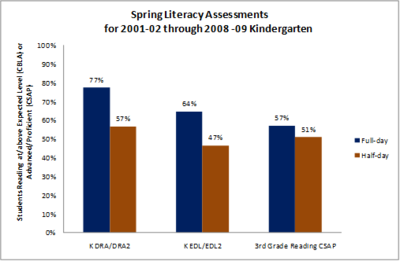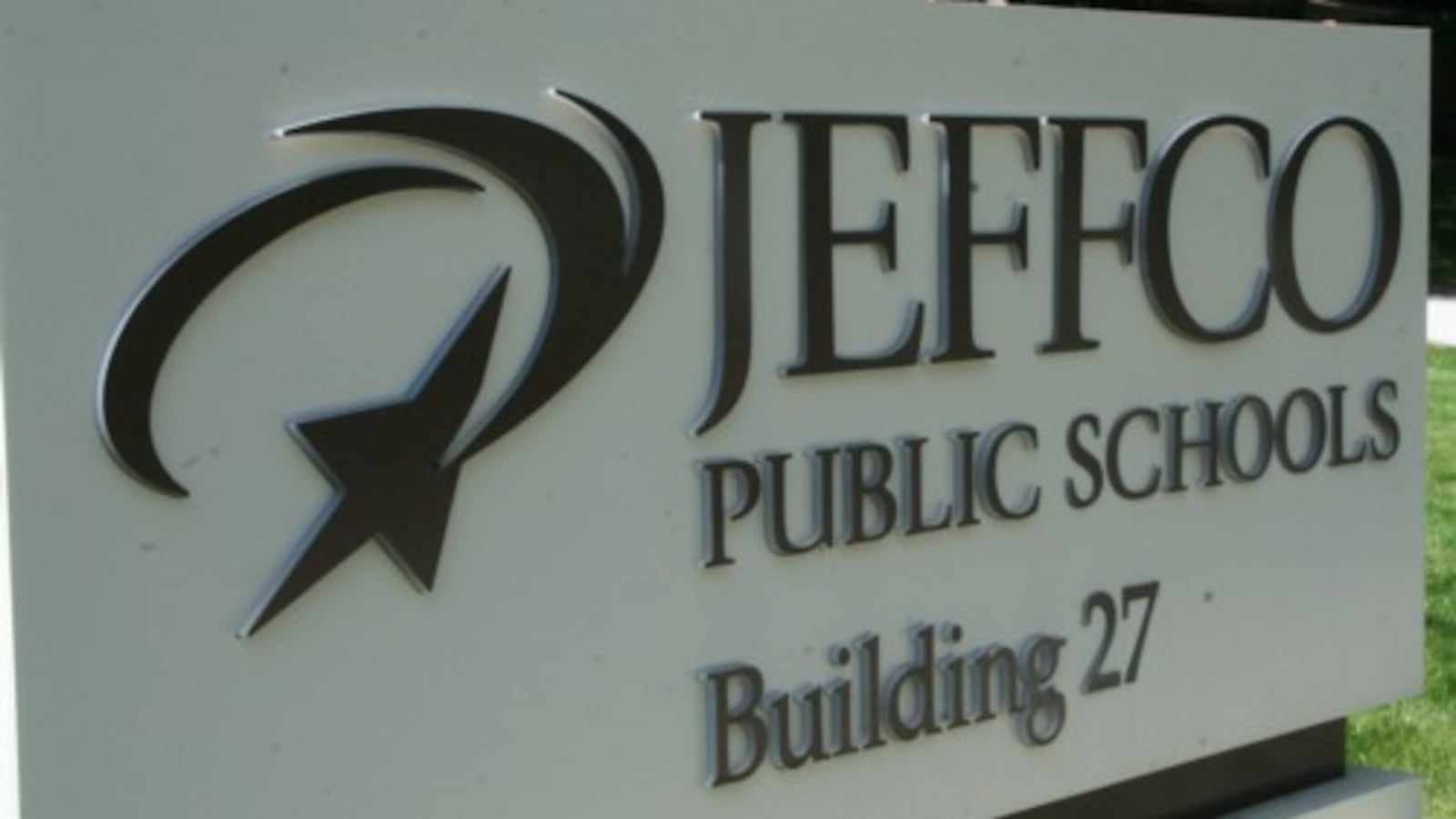In a school district with a $648 million budget, the $600,000 proposal to add free full-day kindergarten at five more Jefferson County elementary schools next year appeared to be a modest expansion of an existing program.
But the removal of that line item by a split vote of the conservative-leaning school board on April 3 has generated an outcry that has some community members questioning the board’s priorities and its approach to the district’s growing low-income population.
Now, a group of concerned parents is mobilizing to speak out against the removal of the line item at the board’s May 1 meeting, and administrators are scrambling meet the board majority’s request for Jeffco-specific data showing the academic benefits of full-day kindergarten.
The fate of the kindergarten expansion proposal is still unclear and there’s been no move to eliminate free full-day kindergarten at the 40 schools where it’s currently offered.
But the debate has highlighted how much the political winds have changed since the district first launched free full-day kindergarten at 30 schools in 2008 and expanded it twice in subsequent years. These days, the board’s three-member majority has taken a skeptic’s stance on the accepted wisdom that full-day kindergarten can help improve reading proficiency, close achievement gaps and reduce retention rates.
School Board President Ken Witt said on Thursday that while he found national studies showing positive outcomes from full-day kindergarten “certainly enlightening,” other studies have shown that the effects don’t last.
“There’s competing information on this topic,” he said.
For veteran observers of the early childhood political landscape, the board’s demand for local data and concerns about possible “fade-out” come as no surprise.
“Typically, it’s the conservative right that’s opposed things like quality preschool and full-day kindergarten,” said Bruce Atchison, director of the Early Learning Institute at the Denver-based Education Commission of the States.
He said while fade-out of full-day kindergarten effects has been demonstrated in some research, “the reality is that’s a couple studies.”
Many more, he said, show that such programs have lasting positive effects on children
Expansion proposal follows trends
In Colorado and nationally, free full-day kindergarten — especially in schools and districts with large concentrations of poor students — has become increasingly common in recent years.
“As we had money available, we made sure it went to free full-day [kindergarten]” said Marcella Hoefner, director of early childhood education in Jeffco.
Parents like Kelly Johnson worry that by blocking expansion of the program, the current board is neglecting the needs of low-income students.
“I just am not getting the picture… that they are looking at those kiddos,” she said. “We’re going to be a have- and have-not district.”
But Witt said the current model in which free full-day kindergarten is available school wide at select schools even though some families can afford to pay for it isn’t efficient or fair.
The 40 Jeffco schools that currently offer free full-day kindergarten — down from 45 a couple years ago — have low-income populations ranging from 36.8 to 95 percent. The five schools that would have added free full-day kindergarten under next year’s budget proposal have low-income populations ranging from about 37 to 43 percent.
Given such numbers, it’s clear that some families not classified as low-income currently have access to free full-day kindergarten and even more would under the expansion proposal. At the April 3 meeting, Witt expressed concern that the proposed expansion could lead the way to free full-day kindergarten at every school. In response, some audience members called out “yes” and applauded.
Witt responded, “No, I’d like to make data-based decisions, data-driven decisions.”
Advocates for the five-school expansion agree that some of the families served by free full-day are not officially poor, but say they may not be particularly well-off either, or may include English language learners who struggle in school because of language barriers, not poverty.
Overall, 34 percent of Jeffco students come from low-income families, up from 18 percent a decade ago. District administrators noted that the county also has the highest homeless population in the state.
Tricky funding
While some states fund universal full-day kindergarten, Colorado does not. Currently, school districts get funding for full-day kindergarteners equal to 58 percent of the amount they receive for first- through 12th-grade students — an average of $3,858 instead of $6,652 per student. That means districts must come up with the rest of the money for free full-day themselves, either from their general funds, federal Title 1 dollars, grants or some other source.
“The more innovative districts are out there raising money,” said Atchison.

Colorado Springs District 11, where 57 percent of district students are low income, is one district that offers free full-day kindergarten at all traditional elementary schools. In Cherry Creek, where 26 percent of students are low-income, free full-day kindergarten is available at six of the district’s more than 40 elementary schools. At other schools there, parents pay $290 a month, or $218 if they’re low income, for an afternoon add-on called “Kindergarten Enrichment.”
In Denver, where 73 percent of students are low income, full-day kindergarten is available at every school, but is only free for students eligible for free and reduced-price meals. Others pay a sliding-scale fee ranging from $90 to $310 a month. All told, 99.27 percent of Denver kindergarteners attend a full-day program. In Jeffco, that number is 75 percent.
Asked if Jeffco would consider a sliding scale fee model for full-day kindergarten, administrators said they were unsure.
Witt said, “We will certainly consider a proposal that’s brought.”
While parent Tina Gurdikian believes the state should fully fund universal full-day kindergarten, she said, “In the meantime, it doesn’t mean the district shouldn’t advocate for it.”
Like other parents concerned about the recent board decision, she feels it will help the district reach some of its key achievement goals, including increasing the percentage of third-graders who score proficient or advanced on third grade reading tests from 80 to 85% by August 2015.
But to Witt, it’s not clear without seeing Jeffco-specific data that free full-day kindergarten is the means to that end.
“We have to have plans that are data-driven,” he said. “Jeffco information is important.”
Gurdikian said, “I understand his request for Jeffco data, but to ignore any state and national data is shortsighted.”
Hoefner, noting that the district’s assessment team is now working to compile kindergarten achievement data, said, “We had not, as a team, ever been asked to provide trend data.”
In neighboring Denver Public Schools, local data on the impact of full-day kindergarten show that full-day students do better in reading than their half-day peers. The differences were largest in kindergarten, but were still evident by third-grade.
For example, 57 percent of Denver’s kindergarteners who attended full-day programs between 2001-02 and 2008-9 scored proficient or advanced on third-grade reading tests , compared to 51 percent of half-day kindergarteners.
Picking and choosing investments
One of the issues that has rankled supporters of free full-day kindergarten over the last few weeks is that some higher-dollar programs that appear to benefit advantaged students most have gotten the green light. These include $7.5 million for charter schools and $855,000 for gifted and talented education.
Johnson cited Sheridan Green Elementary as an example of how the board’s budget choices are creating a disparity in funding for different populations. The school, one of the five that would have added free full-day kindergarten next year, will become a gifted and talented center school thanks to the budget line item.
While Johnson said it’s a great program, she said it “creates another divide.”
“The gifted and talented kids just got significantly invested in…and the at-risk kids don’t get it,” she said.
Witt said funding for charters and gifted and talented education are not related to funding for free full-day kindergarten.
He said they are “separate decisions based on separate issues.”
Interestingly, the community appears to support both types of programming. A recent district survey of more than 13,000 people showed that 71 percent of respondents agreed with investing in free full-day kindergarten and 70 percent agreed with expanding choice options, such as gifted and talented, IB and STEM education.
Parents like Johnson and Gurdikian believe the district can afford to fund both priorities and hope they can convince the board to revive the free full-day kindergarten line item at the next meeting.
“In my mind, it’s still on the table,” said Gurdikian. “We’re not giving up on this yet.”


